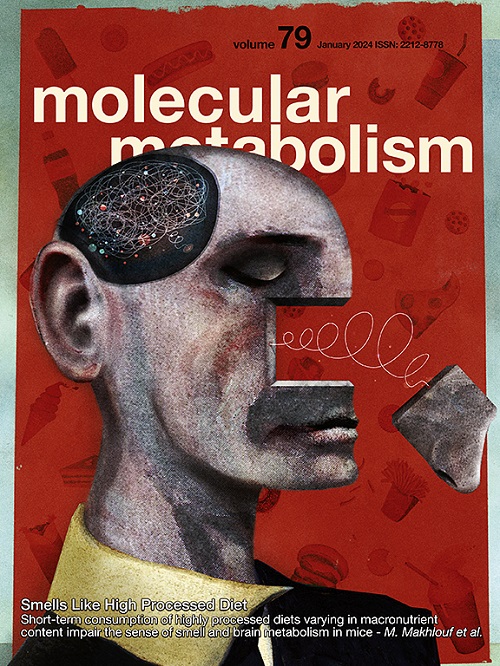FGF21 acts in the brain to drive macronutrient-specific changes in behavioral motivation and brain reward signaling
IF 7
2区 医学
Q1 ENDOCRINOLOGY & METABOLISM
引用次数: 0
Abstract
Objective
Dietary protein restriction induces adaptive changes in food preference, increasing protein consumption over carbohydrates or fat. We investigated whether motivation and reward signaling underpin these preferences.
Methods and Results
In an operant task, protein-restricted male mice responded more for liquid protein rewards, but not carbohydrate, fat, or sweet rewards compared to non-restricted mice. When the number of responses required to access protein reward varied, protein-restricted mice exhibited higher operant responses at moderate to high response requirements. The protein restriction-induced increase in operant responding for protein was absent in Fgf21-KO mice and mice with neuron-specific deletion of the FGF21 co-receptor beta-Klotho (KlbCam2ka). Fiber photometry recording of VTA dopamine neurons revealed that oral delivery of maltodextrin triggered a larger dopamine neuron activation than casein in control diet-fed mice, while casein triggered a larger activation in low-protein diet-fed mice. This restriction-induced shift in nutrient-specific VTA dopamine signaling was lost in Fgf21-KO mice.
Conclusion
These data suggest that the increased FGF21 during protein restriction acts in the brain to induce a protein-specific appetite by specifically enhancing the reward value of protein-containing foods and the motivation to consume them.
FGF21 在大脑中发挥作用,驱动行为动机和大脑奖赏信号发生宏量营养素特异性变化。
膳食蛋白质限制会引起食物偏好的适应性变化,增加蛋白质的摄入量而不是碳水化合物或脂肪。我们研究了动机和奖励信号是否支持这些偏好。在操作任务中,与非限制性小鼠相比,限制蛋白质摄入的雄性小鼠对液体蛋白质奖励的反应更多,而对碳水化合物、脂肪或甜味奖励的反应则更少。当获得蛋白质奖励所需的反应次数不同时,限制蛋白质的小鼠在中等至高反应要求下表现出更高的操作反应。在Fgf21-KO小鼠和神经元特异性缺失FGF21共受体β-Klotho(KlbCam2ka)的小鼠中,蛋白质限制引起的对蛋白质操作反应的增加并不存在。对VTA多巴胺神经元的纤维光度记录显示,在对照组饮食喂养的小鼠中,口服麦芽糊精引发的多巴胺神经元激活比酪蛋白大,而在低蛋白饮食喂养的小鼠中,酪蛋白引发的激活比麦芽糊精大。在Fgf21-KO小鼠中,这种限制引起的营养特异性VTA多巴胺信号转导的转变消失了。这些数据表明,在限制蛋白质摄入的过程中,FGF21的增加在大脑中起着诱导蛋白质特异性食欲的作用,它特别增强了含蛋白质食物的奖赏价值和摄入这些食物的动机。
本文章由计算机程序翻译,如有差异,请以英文原文为准。
求助全文
约1分钟内获得全文
求助全文
来源期刊

Molecular Metabolism
ENDOCRINOLOGY & METABOLISM-
CiteScore
14.50
自引率
2.50%
发文量
219
审稿时长
43 days
期刊介绍:
Molecular Metabolism is a leading journal dedicated to sharing groundbreaking discoveries in the field of energy homeostasis and the underlying factors of metabolic disorders. These disorders include obesity, diabetes, cardiovascular disease, and cancer. Our journal focuses on publishing research driven by hypotheses and conducted to the highest standards, aiming to provide a mechanistic understanding of energy homeostasis-related behavior, physiology, and dysfunction.
We promote interdisciplinary science, covering a broad range of approaches from molecules to humans throughout the lifespan. Our goal is to contribute to transformative research in metabolism, which has the potential to revolutionize the field. By enabling progress in the prognosis, prevention, and ultimately the cure of metabolic disorders and their long-term complications, our journal seeks to better the future of health and well-being.
 求助内容:
求助内容: 应助结果提醒方式:
应助结果提醒方式:


